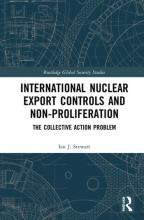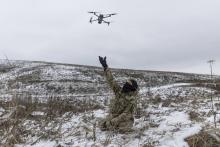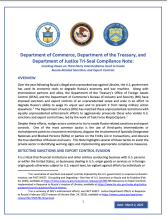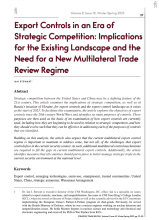This site is maintained by Dr Ian Stewart and reflects his work in the trade compliance and export control space, informed in part by research undertaken at the James Martin Center for Nonproliferation Studies (CNS). It is intended as a platform to showcase and share analytical work related to trade compliance, trade analysis, and, more broadly, nonproliferation.
Comment from Ian Stewart: this post is reproduced from nonproliferation.org. I would welcome the opportunity to give additional book talks, including talks which are more contemporarily focused. Please reach out.
On October 4, 2021 CNS hosted a webinar at the Monterey Institute of International Studies at Monterey, CA featuring Dr. Ian Stewart, executive director at the CNS Washington DC office. He is a specialist on issues related to export controls, sanctions, and nonproliferation.
The following is an excerpt from the Bulletin of Atomic Scientists.
After the announcement on August 1, 2024, of a significant multilateral prisoner exchange between Russia and the United States, most of the coverage of the deal has focused on the return of the U.S. citizens and of an apparent FSB assassin to Russia.
Drones have played a key role on both sides in the conflict in Ukraine. While much attention has focused on Ukraine’s acquisition of UAVs from Turkey and Russia’s reliance on Iranian UAVs, less has been said about how small, mass market drones have been procured from the commercial market. Da-Jiang Innovations (DJI), a Chinese mass producer of quadcopters and one of the world’s leading companies in quadcopters, has seen its products become ubiquitous as Ukrainian and Russian forces fight trench-by-trench for control of the country.
- Read more about Russia’s Quadcopter Express
- Log in to post comments
The US Department of Commerce's Bureau of Industry and Security (BIS), the Department of the Treasury's Office of Foreign Asset Control (OFAC), and the Department of Justice have issued a joint compliance note on the use of third-party intermediaries or transshipment points to evade Russian and Belarusian-related sanctions and export controls. The note highlights the most common tactics used to evade these controls and provides guidance to companies on how to maintain an effective, risk-based sanctions and export compliance program.
- Read more about US Advisory on Russian Sanctions Evasion
- Log in to post comments
The following is an excerpt from the article, available in full at the Strategic Trade Review.





